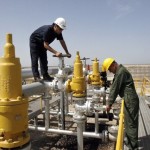Iran oil minister: Support any effort to stabilize market and prices

Iran could support any effort to stabilize oil prices, including cooperation between OPEC and non-OPEC oil producers, the nation’s oil minister said after a meeting Wednesday, according to Reuters.
Oil Minister Bijan Zanganeh said while he supports a production “ceiling” to stabilize oil prices, it’s the first of several steps that should be taken, according to Reuters reports quoting the ministry’s official Shana news agency.
OPEC ministers had traveled to Iran to talk about a possible production freeze between global oil producers. Oil prices bounced slightly on the Iranian oil minister’s comments, with U.S. oil popping above $30 per barrel and Brent futures nearing $34.
It was an unexpected move from Iran, which had already voiced resistance to joining the deal before the talks in Tehran began. Zanganeh did not explicitly say in his remarks quoted by Shana that Iran would keep its own output at its January level.
If an agreement is reached, it could become the first joint OPEC and non-OPEC deal in 15 years, as oil producers seek to boost persistently low oil prices.
Benchmark U.S. WTI light sweet crude was 4.51 percent higher at $30.38 a barrel, while European Brent crude rose 5.28 percent to $33.88 a barrel.
On Tuesday, WTI settled 1.4 percent lower in the Asian session after gaining as much as 7.1 percent intraday; Brent settled 3.6 percent lower after jumping 6.5 percent intraday on hopes of a supply cut deal.The energy commodity has declined 70 percent since the summer of 2014.
The price gyrated Tuesday on supply-cut hopes ahead of a meeting of top exporters in Doha, Qatar. Those hopes were dashed when Russiaand Saudi Arabia agreed to freeze output at January’s levels instead. Qatar and Venezuela have already agreed to participate but the deal was also contingent on other producers joining in.
Iran, which was not present on Tuesday’s meeting, had planned to increase output by at least 500,000 barrels a day this year following the lifting of Western sanctions last month. On Wednesday, Iran’s OPEC envoy told Shargh newspaper that it was “illogical” to ask Iran to freeze its oil production level, Reuters reported.
“Asking Iran to freeze its oil production level is illogical … when Iran was under sanctions, some countries raised their output and they caused the drop in oil prices … how can they expect Iran to cooperate now and pay the price?” Mehdi Asali was quoted as saying.
This stance was reiterated again just before the meeting Wednesday when an Iranian oil official said the country wanted to keep boosting output, according to Dow Jones, which cited the Shana news agency.
Market watchers received news of the deal on Tuesday with skepticism because not only do Iran and Iraq need to agree to the freeze, but even if the deal went ahead, it would be unlikely to solve the problem of a supply glut.
Russia pumped a post-Soviet record high of 10.88 million barrels a day in January, while Saudi Arabia’s output was near its record high around 10.2 million barrels a day, said Sebastien Marlier, senior commodities editor at The Economist Intelligence Unit.
Questions were also raised over whether Russia and indeed Saudi-dominated OPEC itself would be disciplined enough to respect the agreement.
“The success of the deal will depend on Russia playing its full part,” said Julian Jessop, Capital Economics’ head of commodities research.
“The track record here is not good — Moscow reportedly reneged on a similar deal in 2001, although the stakes are arguably higher now,”
Russia also failed to respect a similar agreement with OPEC producers in the 1990s, said Marlier.
Meanwhile, OPEC was believed to already be pumping above its previous 30 million barrel-a-day ceiling as producing countries sought to pump up volume to offset losses from sliding prices. The oil cartel was pumping 33.1 million barrels a day recently, according to London-based Capital Economics.
Dennis Gartman, founder and publisher of “The Gartman Letter,” told CNBC’s “Fast Money” that Tuesday’s deal — which he called “the last great hope for oil” — was a huge disappointment.
“Anybody who even thought there would be talk of a production cut had to understand, though, that the one thing [you] can know about OPEC is they cheat. They cheat on everything. Even if they had announced a production cut, nobody would have taken it seriously but this was really a great disappointment,” he said.
Most importantly, any meaningful recovery in oil prices in an oversupplied market would undermine the Saudis’ long-standing strategy of not cutting supply to squeeze out higher-cost producers such as U.S. shale companies. A resurgence in shale output would then add to the existing over-supply problem.
“If the other producers do not agree, then little will change, but even if they do, any significant price recovery could increase the incentives for U.S. shale output to start growing again,” Barclays analysts Miswin Mahesh and Kevin Norrish said in a note.
Source: CNBC





























